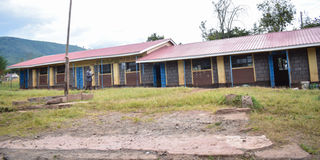Rongai school with a rich history but poor infrastructure

A section of Tuiyotich primary school that once housed an Italian in the pre-colonial times.
In Nakuru’s Rongai sub county is a little known Primary School called Tuiyotich Primary school.
They say there is always a meaning to a name and here, Mtaa Wangu during a visit to the school has learnt that the name ‘Tuiyotich’ in the Kalenjin language means a place where cows meet.
However, because of the cosmopolitan aspect of the area, the cows here are now replaced by people from different communities.
The school sits on a seven-acre piece of land with a population of around 450 pupils and 10 TSC-teachers.
A squatters' piece of land called Kalung'a borders the school and here another challenge of roads emerges due to the topography of the area.
In fact, a story is told that whenever someone dies the coffin has to be carried by men on their shoulders due to lack of roads.
This is a home to many workers of coffee farms in the area that also borders Koibatek Forest that goes all the way to Molo.
We meet Mr.James Rono who happens to have schooled in this particular school and now he is a teacher at the same school.
According to him, the school has a very rich history adding that where the school sits used to be a home to one Italian who owned a vast piece of land all the way to Rongai Centre.
Rono reveals that the Italian white settler was a tough one such that locals nicknamed him 'Mkali'.
But as fate would have it, Mkali later left Kenya paving way for the start of the school around 1984 on the land following an agreement between the communities around the area.
“Where the school sits used to be a home to one of the white settlers whom due to his toughness the locals here nicknamed him ‘Mkali’. But he later went back to Italy and that gave birth to the school that you see right now,” says Rono.
A spot check at the school reveals that indeed there were some old structures that were demolished.
Mr. Rono points at some area just within the assembly of the school where he says the Italian had his house.
However, the old structures were demolished paving way for the construction of the new school structures.
Majority of the classrooms have been constructed by the Rongai Constituency Development Fund(NG-CDF).
However, teaching staff remains a challenge as many teachers who come never stay long due to the hardship in the area with very poor infrastructure among them roads that lead to the school.
For instance, in the last two years, the school has had seven different head teachers.
It is also one of the many schools in the rural set-ups with no electricity connectivity despite the government assuring that all schools will be connected to electricity.
A spot check shows that even the contractor who was assigned to construct the new classrooms at the school did not consider this as no aspect of wiring has been done.
Speaking to Mtaa Wangu, the school’s Deputy head teacher Mr. Solomon Bari admitted that the school has been struggling with challenges of teacher-pupil ratio as the government has not classified the area as one with hardship despite the many challenges.
He reiterated the need for the government to step in and address the issue of electricity connectivity at the school as well as post more teachers to meet the required number.
According to Mr. Bari, the high poverty levels have continued to render pupils hopeless in the area.
“This school can do better if fully supported by the government and all the local leaders in the area in addressing some of the challenges,” says Bari.
